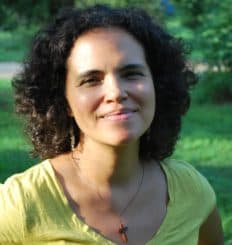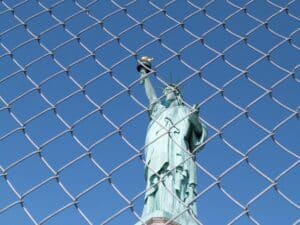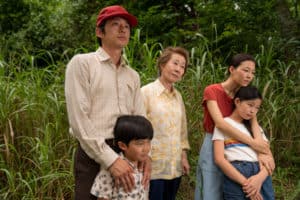A two-part interview with two sisters who recently immigrated to the United States

“When your back is up against the wall, you do what you have to do to survive.”
Elena* said this to me, in Spanish, after I spent over an hour listening to her and her younger sister, Yasmin*, share their immigration stories. Elena had begun our conversation by saying “Entre la espalda y la pared,” echoing the wisdom of Howard Thurman, who used the same phrase in Jesus and the Disinherited: “The significance of the religion of Jesus to people who stand with their backs against the wall has always seemed to me to be crucial…”
Elena and Yasmin allowed me to record our conversation about their decision to immigrate from Central America to the United States because they wanted to share their stories, especially with people in this country who, like them, are followers of Jesus.
Too many leaders who identify as Christian are turning a blind eye to the suffering at the border. Take, for example, conservative Evangelical Dr. James Dobson, who released a letter after his recent visit to the border that reinforces a viewpoint that the “Christian” thing to do would be to build a wall to close off opportunities for Elena and her family to live on US soil. What that perspective fails to realize is that many of the people entering this country are firm believers in Christ, people whose faith in God and understanding of the scriptures have sustained them through persecution, rejection, and abuse.
For many people, it was their faith that led them to make the perilous decision to enter this country without documents. As a young woman who is fluent in two languages and gaining proficiency in English, Elena acknowledged, in English, “We don’t have a voice in this country. We as immigrants face a lot of racism; we are suffering on the inside and suffering on the outside. No one comes here for fun. We know that we are risking our lives.” These two sisters would like people, especially those who claim to follow Jesus, to hear their voices and understand their choices.
“We don’t have a voice in this country. We as immigrants face a lot of racism; we are suffering on the inside and suffering on the outside. No one comes here for fun. We know that we are risking our lives.”
Elena and Yasmin crossed the border at different times and for different reasons, but both were driven by their deep faith that God was leading and protecting them. Our conversation moved between English and Spanish, with occasional moments when the sisters spoke to one another in the ancient language of their mountain village. They are picking fruit all summer because no one will hire them for the “marketable skills” that they developed as small business managers in their home country.
We will begin with Elena’s story. (The story of Yasmin’s journey to save the life of her unborn child will be in an upcoming post.) Both Elena and Yasmin have had an opportunity to read and offer input on these articles.
Elena and her sister Yasmin identify as Pentecostal, Evangélicos in Spanish. If the word “Evangelical” is to have any chance of being redeemed in contemporary language in the United States, it should be equated with good news, a voice for the voiceless, hope for the hopeless and a trust in a God who tears down the “wall of hostility” between us.
A few years ago, Elena crossed the border into the United States primarily to escape partner violence. She was in her late teens and running a small shop when she began a relationship with a man who seemed, at first, to be kind and loving, but he became abusive. Elena recalls, “He said that he was a Christian but he was manipulative, controlling and threatening. He was a hypocrite.”
She felt trapped, and feared for her own safety and the safety of her family. She was ashamed to tell her family for fear that they would blame her for getting involved with him in the first place. She feared going to the police because of the rampant corruption and sexism in her country that rarely protects the rights of survivors of partner violence. The only option that she saw to protect herself and her family was to leave the country.
She told her partner that she would go to the US and stay in touch, but she had a plan to leave and break up with him from a safe distance. Elena and her family endured cyber-bullying, stalking, death threats, shaming and deep damage to her reputation, but they survived. (The US Administration is currently resisting UN recommendations to honor the asylum claims of survivors of domestic violence.)
Elena believes God gave her the courage to break up with her abusive partner and to endure the sleepless nights, terror, and uncertainty of entering a country where she knew she would not be welcome.
Elena’s first attempt to travel into the US failed. She believes her second attempt was successful because she fasted and prayed. During her journey, she survived a near-drowning experience. She survived a week in the desert with limited food and water. “Every immigrant has their own experience,” she says. “We know that we might die trying to enter this country. We know that the US government will not welcome us or give us a legal way to come here and stay, but we come anyway. It is not fun, it is not easy, but when your back is against the wall, it is what we do.”
She still struggles when she thinks about the people who did not survive the journey with her. There was a young couple that got separated from her group as they walked through the mountains of the Sonoran desert. In order to avoid detection by the border patrol, they went deep into the desert, then separated and were told to meet at the next mountain. The last she heard from the couple they were lost, out of food and water, and in great pain. They never reconnected on the other mountain.
“We know that we might die trying to enter this country. We know that the US government will not welcome us or give us a legal way to come here and stay, but we come anyway…when your back is against the wall, it is what we do.”
I asked Elena if she thought a wall or increased security would stem the flow of immigration. She said no: “People will find a way. We feel we have no other options—we are risking our lives to be here, because we want to survive.” She also said that, after crossing the border, “It is so hard to live as an undocumented person in the US. It is hard to learn the language or find a job that matches your skills and experience. We aren’t allowed to drive, we can’t get health insurance, they pay us less and offer substandard housing, they know we can’t dispute greedy landlords and employers because we are afraid of deportation. We are afraid to speak up for our rights [and] our families are depending on us for money.” Elena never picked fruit a day of her life in her home country; now it is the only work she can find.
Knowing all of this, she still insists it is better and safer than what they left behind. She also admitted how heart-wrenching it is to leave your family behind, knowing that you can’t return.“I just want people to know, we aren’t doing this for fun. We aren’t doing this because we want to do it, but because we want to survive,we want to save our lives from the violence, and the dangers of life or death that we face in our countries.”
* Names and identifying details have been changed in order to protect their privacy and their immigration cases.
 Josina Guess is a writer and faith leader based in rural Georgia, where she lives on four acres with her husband and their four children. Her writing has appeared in Sojourners, The Christian Century, several websites and an essay forthcoming in Fourth Genre. She posts thoughts and poems on things like family, race, gardening, and cooking at Josina’s Kitchen Table.
Josina Guess is a writer and faith leader based in rural Georgia, where she lives on four acres with her husband and their four children. Her writing has appeared in Sojourners, The Christian Century, several websites and an essay forthcoming in Fourth Genre. She posts thoughts and poems on things like family, race, gardening, and cooking at Josina’s Kitchen Table.
Tomorrow, read how Elena’s sister, Yasmin, crossed the border to protect her unborn child.


